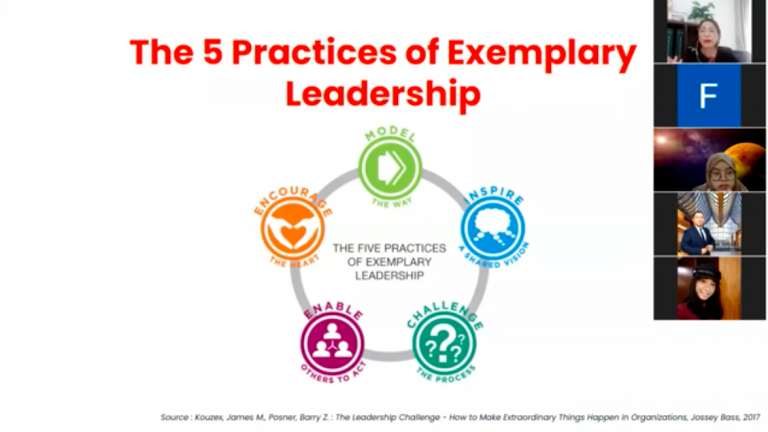In this volatile, uncertain, complex, and ambiguous (VUCA) world and disrupted by a massive implementation of technology, leaders are expected to help accomplish the goal that has been set. Therefore, as the demand for leaders will increase, leaders begin to learn from an early stage of professional development to acquire leadership abilities.
“Leadership is about a set of actions rather than a formal position. It’s a choice,” Veranita Yosephine, the CEO of Air Asia stated. In a discussion on Tuesday (2/3/2021), Veranita guided students to get successful leadership.
She revealed, there are five practices of exemplary leadership. When leaders are at their best, they demonstrate five key behaviors. Those are, namely, modeling the way, inspiring a shared vision, challenging the process, enabling others to act, and encouraging the heart.
Leaders create guidelines on how individuals (constituents, peers, colleagues, and customers) should be regarded and how they should achieve their objectives. They establish positive ambitions and set a precedent for those to emulate.
Due to their beliefs and confidence to make a difference, they imagine the future and create a special and successful picture of what the company will become. They will enlist people in their visions by their charisma and persuasion.
Additionally, they are always searching for innovative ways to better the organization. Since dynamic reform has the potential to intimidate citizens and stifle actions, policymakers can set interim targets for people to accomplish small victories when working toward greater goals.

As leaders make efforts to foster a culture of confidence and human dignity, they actively involve, strengthen, and motivate others. Last but not least, leaders appreciate the commitments that people make in order to keep their faith and, make impacts.
A leader motivates people to take action while still directing their actions. They must be personable enough for others to obey their orders, and they must be able to think critically enough to determine how to better use the tools available for an organization. Leadership is tied to success in the industry, and the concept of leadership must take this into account.
Although leadership isn’t inherently tied to profit, those who are seen as good leaders in corporate settings are those who help their company’s growth. “Making an impact is about leading people because oftentimes, we can only make a big impact with the support of many people. We are not a lone ranger, we can’t possibly do everything all by ourselves,” Veranita said.

Leadership, at the end of the day, is the fundamental aspect that we need to develop from an early age because in the end, everywhere we go, we strive to create an impact. We want to make sure that the things we do correspond to the things we like to do and change them for the better.
To emphasize, Veranita continued to highlight the importance of togetherness as a critical aspect to hold in order to be a great leader. The sum of all the individuals’ efforts is greater than their impact individually.




